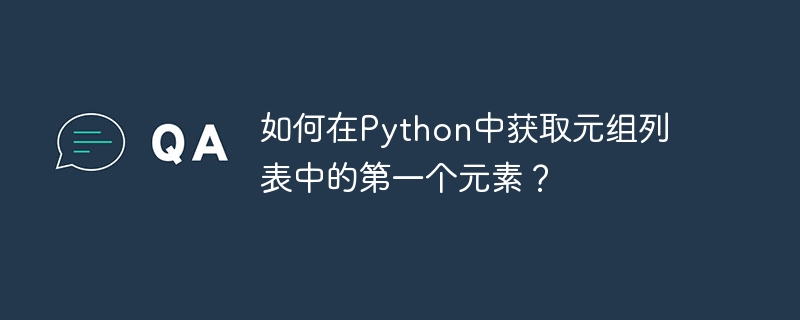
元組是 Python 中不可變的資料類型,可以保存異質資料類型。另一方面,列表是可以容納異質資料的多種資料類型。在本文中,我們將探索使用基於函數的元件從元組列表中檢索第一個元素的各種方法。我們將探索幾種方法,如循環、列表理解、zip 方法等。
循環是幾乎所有程式語言中的常見語句。我們可以使用循環語句以及Python可迭代物件的索引屬性來存取可迭代物件的第一個元素。由於在我們的例子中,我們只想存取第一個元素,因此我們可以在每次迭代中使用索引號 0。
在下面的範例中,我們建立了一個函數,該函數傳回一個清單作為輸入,並以清單資料類型的形式傳回清單的所有第一個元素。在該函數下,我們建立了一個空元組,並且在列表的每次迭代下,我們將元組元素的第一個元素附加到初始化的列表中。後來我們創建了一個元組並呼叫該函數來測試結果。
def get_first_element_using_loop(tuples_list):
first_elements = []
for tuple in tuples_list:
first_element = tuple[0]
first_elements.append(first_element)
return first_elements
t = [
('Apple', 5, True),
('Banana', 3, False),
('Orange', 2, True),
('Grape', 4, False),
('Mango', 6, True)
]
print(f"The first elements of the list are: {get_first_element_using_loop(t)}")
The first elements of the list are: ['Apple', 'Banana', 'Orange', 'Grape', 'Mango']
列表推導式是在 Python 中組合表達式和語句並使用它們在列表中創建元素的一種非常方便的方法。根據我們的需要,我們可以使用索引方法和for迴圈作為條件表達式來建立清單中的元素。
在下面的範例中,我們建立了一個函數,它接受清單並傳回包含元組的所有第一個元素的清單。我們使用列表理解技術來建立名為first_elements 的列表元素。
def get_first_element_using_comprehension(tuples_list):
first_elements = [tuple[0] for tuple in tuples_list]
return first_elements
t = [
('Apple', 5, True),
('Banana', 3, False),
('Orange', 2, True),
('Grape', 4, False),
('Mango', 6, True)
]
print(f"The first elements of the list are: {get_first_element_using_comprehension(t)}")
The first elements of the list are: ['Apple', 'Banana', 'Orange', 'Grape', 'Mango']
Map 是 Python 的另一個重要的內建方法。 map 方法將函數應用於可迭代物件的所有元素。它有兩個參數,即函數名稱和可迭代物件。我們可以使用 lambda 函數和 map 方法來存取列表中元組的第一個元素。
在下面的範例中,我們建立了一個名為 get_first_element_using_map 的函數,該函數取得由元組元素組成的列表,並傳回該列表的元組元素的所有第一個元素。我們使用 map 方法將 lambda 函數應用於每個列表元素。
def get_first_element_using_map(tuples_list):
first_elements = list(map(lambda x: x[0], tuples_list))
return first_elements
t = [
('Lemon', 3, False),
('Strawberry', 7, True),
('Watermelon', 1, True),
('Pineapple', 4, False),
('Kiwi', 2, True)
]
print(f"The first elements of the list are: {get_first_element_using_map(t)}")
The first elements of the list are: ['Lemon', 'Strawberry', 'Watermelon', 'Pineapple', 'Kiwi']
這是提取所有第一個元素的棘手方法。首先,我們可以使用for迴圈;接下來,我們可以透過指定一些名稱來解壓縮第一個。我們也可以用*指定其他元素。我們可以使用列表理解將所有元素附加到列表中。
for first_element, *_ in iterable:
# other codes
這裡我們將第一個元素指定為first_element。請注意,您可以為其指定任何名稱。接下來,「*_」指定我們還有其他元素,但我們對這些不感興趣。 “可迭代”是任何可迭代對象,例如元組列表等。
在下面的程式碼中,我們使用了Python的列表理解技術和解包技術。這裡我們將列表中每個元組元素的第一個元素命名為first_element,並將其附加到列表中。我們創建的函數是一個非空函數,它會傳回生成的列表。
def get_first_element_using_unpacking(tuples_list):
first_elements = [first_element for first_element, *_ in tuples_list]
return first_elements
t = [
('Lemon', 3, False),
('Strawberry', 7, True),
('Watermelon', 1, True),
('Pineapple', 4, False),
('Kiwi', 2, True)
]
print(f"The first elements of the list are: {get_first_element_using_unpacking(t)}")
The first elements of the list are: ['Lemon', 'Strawberry', 'Watermelon', 'Pineapple', 'Kiwi']
Python 中的 zip() 函數是一個內建函數,可讓您將多個可迭代物件(例如列表、元組或字串)組合成單一元組迭代器。 zip() 產生的每個元組都包含輸入可迭代中對應位置的元素以及元素本身。由於傳回值是由元組元素組成的列表,因此我們可以使用索引方法來存取列表的第一個元素。
在下面的程式碼中,我們建立了一個非空函數,它將列表作為參數並傳回元組列表中的第一個元素。如果列印 list(zip(*tuples_list)) 的結果,您將得到以下結果:
[('檸檬', '草莓', '西瓜', '鳳梨', '獼猴桃'), (3, 7, 1, 4, 2), (False, True, True, False, True)]
由於我們只想要清單中的第一個元素,因此我們使用索引方法並設定index=0。
def get_first_element_using_unpacking(tuples_list):
return list(zip(*tuples_list))[0]
t = [
('Lemon', 3, False),
('Strawberry', 7, True),
('Watermelon', 1, True),
('Pineapple', 4, False),
('Kiwi', 2, True)
]
print(f"The first elements of the list are: {get_first_element_using_unpacking(t)}")
The first elements of the list are: ('Lemon', 'Strawberry', 'Watermelon', 'Pineapple', 'Kiwi')
在本文中,我們了解如何在 Python 中取得元組清單中的第一個元素。 Python 中有許多方法可以用來執行任務,例如循環方法、清單理解、解包等。哪種方法最好的答案取決於使用情況和其他因素。我們強烈建議讀者嘗試這些概念,以便更好地理解這些主題。
以上是如何在Python中取得元組清單中的第一個元素?的詳細內容。更多資訊請關注PHP中文網其他相關文章!




